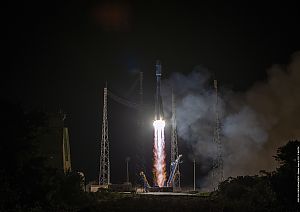Galileo constellation grows after successful 11th launch

EUSPA/PR - Saturday morning, the Soyuz VS-26 launch vehicle successfully lifted off from Kourou (French Guiana) for a flight lasting almost four hours until Galileo satellites 27 and 28 separated from the rocket. The 11th Galileo launch is the first of six launches (each with two satellites) that will enable Galileo to provide more precise data to existing users and open up new market opportunities.
At 5.09 CET, the Galileo satellites were released from the launch vehicle's final stage; they are currently being managed by the European Union Space Programme Agency (EUSPA) and its contract team, which is responsible for operating the satellites from separation from the launch vehicle as part of the Launch and Early Orbit Phase (LEOP).
The LEOP is one of the crucial phases of a space mission; it includes the launch of the spacecraft and its positioning in the correct orbit. In addition, the first satellite elements are gradually switched on and tested. In the coming days, the EUSPA team responsible for satellite operations after separation from the launch vehicle will control the satellites for the first time from the dedicated Galileo Control Centre in Oberpfaffenhofen, Germany, until they are accurately placed in their home orbit at an altitude of 23220 km. After rigorous in-orbit testing and commissioning, the satellites will begin Galileo service.
Under a European partnership, the European Commission is responsible for the management of Galileo and EUSPA oversees the operation and provision of services; the European Space Agency (ESA), as the planning authority, is responsible for overseeing the development, procurement of the satellites and the ground segment.
"Today we can proudly celebrate another milestone achieved with the European Union's most ambitious and largest industrial project," says EUSPA Executive Director Rodrigo da Costa. The successful addition of satellites 27 and 28 to the world's most precise positioning system is a very important step for our more than 2 billion users around the world and is the result of our solid cooperation with the European Commission, ESA and our industry partners. I would like to express my deepest gratitude to all those involved who are working tirelessly to ensure the success of the mission."
About the European Union Space Programme Agency (EUSPA)
The European Union Space Programme Agency (EUSPA) provides reliable and secure European satellite navigation services, promotes the commercialisation of Galileo, EGNOS and Copernicus data and services, and coordinates the future government satellite communications programme GOVSATCOM. EUSPA is responsible for the safety accreditation of all components of the EU space programme. By fostering the development of an innovative and competitive space sector and cooperating with the entire EU space community, EUSPA contributes to the European Green Deal, the digital transformation, security and safety of the Union and its citizens, while strengthening its independence and resilience.
